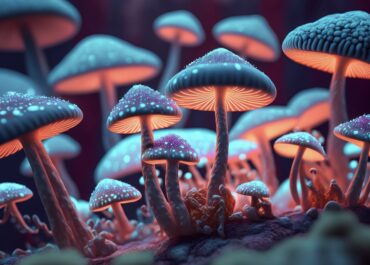Psychedelics: Exploring Consciousness, Benefits, and Responsible Usage
Psychedelics have long been a subject of fascination and controversy. From ancient rituals to modern clinical trials, these mind-altering substances have been used across cultures for their ability to expand consciousness and heal the mind. In recent years, there has been a resurgence of interest in psychedelics, not only for their potential to offer profound spiritual experiences but also for their therapeutic benefits in treating mental health conditions like depression, anxiety, and PTSD.
This blog will explore how psychedelics work, their potential benefits, and the importance of responsible usage.
Understanding Psychedelics
Psychedelics are a class of substances that alter perception, mood, and cognitive processes. They include natural compounds like psilocybin (found in magic mushrooms), mescaline (from peyote and other cacti), and DMT (present in plants used to brew ayahuasca), as well as synthetic substances like LSD (lysergic acid diethylamide) and MDMA (3,4-methylenedioxymethamphetamine). When ingested, psychedelics affect the brain’s serotonin receptors, particularly the 5-HT2A receptor, which plays a role in mood, perception, and cognition.
Psychedelics induce altered states of consciousness, often described as “trips,” which can include visual and auditory hallucinations, an altered sense of time and space, and deep emotional experiences. These experiences vary greatly depending on the substance, dosage, and individual, but they often lead to a heightened sense of awareness and introspection.
The Benefits of Psychedelics
1. Therapeutic Potential for Mental Health
One of the most promising areas of psychedelic research is their potential to treat mental health conditions. Studies have shown that psychedelics can provide significant relief for individuals suffering from treatment-resistant depression, anxiety, and post-traumatic stress disorder (PTSD).
For example, psilocybin has been studied for its ability to induce profound, meaningful experiences that help patients gain new perspectives on their emotional struggles. These experiences often lead to long-lasting reductions in symptoms. A 2020 study published in JAMA Psychiatry found that psilocybin-assisted therapy resulted in significant reductions in depression symptoms, with many participants reporting lasting improvements even months after the sessions.
MDMA, commonly known as ecstasy, has also been studied for its therapeutic effects, particularly in treating PTSD. In controlled clinical settings, MDMA-assisted therapy has shown promising results by allowing patients to revisit traumatic memories in a safe, emotionally open state, reducing the distress associated with those memories.
2. Expanding Consciousness and Spiritual Growth
Psychedelics have been used for millennia in spiritual and religious ceremonies, with indigenous cultures in the Americas using substances like peyote and ayahuasca to facilitate deep, transformative experiences. Many people who take psychedelics report a sense of unity with the universe, enhanced creativity, and heightened introspection. These substances can break down ego defenses, allowing individuals to confront deep-seated fears, traumas, or unresolved emotional issues.
In particular, the concept of “ego dissolution” is commonly experienced during psychedelic trips, where the individual’s sense of self temporarily fades away. This can result in a profound sense of interconnectedness and oneness with the world, leading to spiritual insights and personal growth.
3. Creativity and Problem-Solving
Psychedelics have long been associated with creativity. Iconic figures like Steve Jobs and Francis Crick (one of the co-discoverers of the structure of DNA) have credited LSD with inspiring groundbreaking ideas. Psychedelics promote “divergent thinking,” which is the ability to think outside of traditional patterns and generate new solutions to problems.
The heightened creativity experienced during a psychedelic trip can lead to novel insights, artistic inspiration, and out-of-the-box problem-solving. This has led to increasing interest in microdosing—taking sub-perceptual doses of psychedelics to boost creativity, focus, and productivity without the full psychedelic experience.
The Importance of Responsible Usage
While the potential benefits of psychedelics are significant, it’s crucial to approach these substances with care and responsibility. Psychedelics are powerful tools, and without proper preparation and guidance, they can lead to negative or challenging experiences, commonly referred to as “bad trips.”
1. Set and Setting
The concepts of “set and setting” are foundational to responsible psychedelic use. “Set” refers to the mindset of the individual, including their emotional state, intentions, and expectations going into the experience. “Setting” refers to the physical and social environment where the experience takes place. Both factors play a major role in shaping the outcome of a psychedelic experience.
Anxiety, unresolved trauma, or negative emotions can influence the trip in unpredictable ways, while a chaotic or unsafe environment can contribute to disorientation. A calm, safe, and supportive setting, combined with a positive mindset, can help ensure a more beneficial and enlightening experience.
2. Guidance and Integration
For those exploring psychedelics for therapeutic or spiritual purposes, having an experienced guide or therapist present can make a significant difference. Guides can help navigate challenging emotions or experiences that arise during a trip, providing reassurance and direction.
Equally important is the integration process—the period after the psychedelic experience where individuals reflect on the insights gained and incorporate them into their daily lives. Integration therapy or support groups can be helpful in making sense of the experience and applying its lessons to personal growth and healing.
3. Legal and Health Considerations
It’s essential to be aware of the legal status of psychedelics in your area, as they remain illegal in many parts of the world. However, some places are beginning to decriminalize or regulate their use, especially in therapeutic settings.
In terms of health, psychedelics are generally considered non-addictive, but they can trigger psychological distress in individuals with pre-existing mental health conditions, such as schizophrenia. It is always wise to consult with a healthcare professional before considering psychedelic use, especially if there are concerns about mental health.
Conclusion
Psychedelics hold incredible potential for exploring consciousness, healing mental health issues, and fostering personal and spiritual growth. However, these powerful substances should be approached with caution, respect, and responsibility. As research continues to expand, we may find even more ways in which psychedelics can positively impact human well-being, creativity, and self-understanding.
